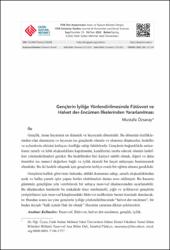Gençlerin İyiliğe Yönlendirilmesinde Fütüvvet ve Halvet der-Encümen İlkelerinden Yararlanılması
Citation
ÖZSARAY, Mustafa. "Gençlerin İyiliğe Yönlendirilmesinde Fütüvvet ve Halvet der-Encümen İlkelerinden Yararlanılması" FSM İlmî Araştırmalar İnsan ve Toplum Bilimleri Dergisi, 19 (2022): 117-134.Abstract
Gençlik, insan hayatının en dinamik ve heyecanlı dönemidir. Bu dönemin özelliklerinden
olan dinamizm ve heyecan ise gençlerde olumlu ve olumsuz düşünceler, hedefler
ve eylemlerin etkisini katlayıcı özelliğe sahip faktörlerdir. Gençlerin bağımlılıkla neticelenen
zararlı ve kötü alışkanlıklara kapılmadan, kendilerini mutlu edecek olumlu hedeflere
yönlendirilmeleri gerekir. Bu hedeflerden biri kariyer sahibi olmak, diğeri ve daha
önemlisi ise manevî değerlere bağlı ve iyilik eksenli bir hayat anlayışını benimsemek
olmalıdır. Bu iki hedefe ulaşmak için gençlerin terbiye esaslı bir eğitim alması gereklidir.
Gençlerin kulluk görevinin farkında, ahlâkî donanıma sahip, zararlı alışkanlıklardan
uzak ve halka yararlı işler yapan fertler olabilmeleri daima arzu edilmiştir. Bu hususta
günümüz gençliğine yön verebilecek bir anlayış tasavvuf düşüncesinden uyarlanabilir.
Bu düşünceden hareketle bu makalede önce merhametli, yiğit ve iyiliksever gençlerin
yetiştirilmesi için tasavvuf kitaplarındaki fütüvvet tariflerinin önemi üzerinde durulacaktır.
Bundan sonra ise yine gençlerin iyiliğe yönlendirilmesinde “halvet der encümen”, bir
başka deyişle “halk içinde Hak ile olmak” ilkesinin yararına dikkat çekilecektir. Youth is the most dynamic and exciting period of human life. Dynamism and excitement,
which are the characteristics of this period, are factors that multiply the effects of
positive and negative thoughts, goals and actions in young people. Young people should
be guided towards positive goals that will make them happy, without falling into harmful
and bad habits that result in addiction. One of these goals should be to have a career, and
the other and more importantly, to adopt an understanding of life based on moral values
and benevolence. In order to achieve these two goals, it is necessary for young people to
receive a manners-centered education.
It has always been desired for young people to be individuals who are aware of
their servitude, are morally equiped, are free from harmful habits and are useful for the
public. In this regard, an understanding that can guide today’s youth can be adapted from
mysticism thoughts. Based on this idea, this article will first focus on the importance of
futuwwa principles in Sufi books for raising compassionate, brave and benevolent young
people. After that, attention will be drawn to the benefit of the principle of “halvet der
encümen”, in other words, “to be with God in public” in directing the youth to goodness.



















